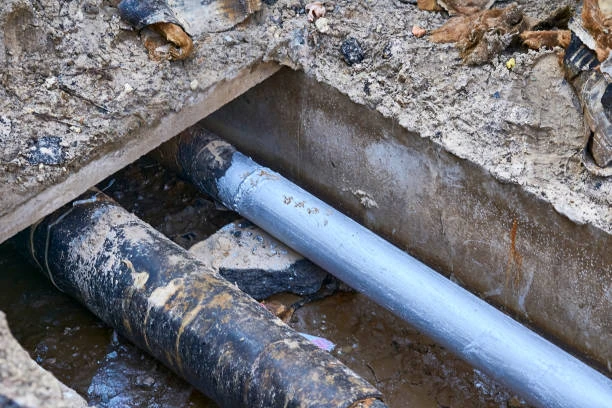Recent reports have raised concerns about the potential health risks associated with PVC water pipes, particularly in relation to long-term exposure. People widely use polyvinyl chloride (PVC) for plumbing, but concerns about its safety for drinking water are increasing. In North Jersey, communities are exploring alternatives to PVC for water distribution systems. This article explores the health risks linked to PVC water pipes, the alternatives being used in North Jersey, and the ongoing debate over the safety of drinking water infrastructure.
What Are PVC Water Pipes and Why Are They Commonly Used?
Manufacturers make PVC water pipes from polyvinyl chloride, a synthetic plastic polymer. They use PVC in plumbing and water distribution systems because of its durability, low cost, and ease of installation. The material is lightweight, resistant to corrosion, and can last for decades with proper maintenance. Plumbers and contractors commonly use PVC pipes for both residential and commercial water lines, as well as for irrigation systems and sewage infrastructure.
The affordability of PVC pipes has made them a popular choice for municipalities and construction companies. They are cheaper than alternatives like copper or steel pipes, which makes them a cost-effective option for large-scale water distribution projects. Additionally, PVC pipes are relatively easy to manufacture, which further drives their widespread use in the plumbing and water industry.
Health Risks Associated with PVC Water Pipes
Recent studies have raised concerns about the potential health risks of PVC water pipes, especially when it comes to drinking water. One of the main issues is the use of chemical additives, such as phthalates and bisphenol A (BPA), in PVC production. Manufacturers add these chemicals to make PVC pipes flexible or durable, but they may leach into the water over time, especially when exposed to heat or UV rays.
Studies link exposure to these chemicals with various health problems, including hormonal disruption, reproductive issues, and an increased risk of cancer. Although the levels of leaching are generally low, long-term exposure to these chemicals could still pose a risk, particularly for vulnerable populations like children and pregnant women.
Another concern is the potential for PVC pipes to release vinyl chloride, a carcinogenic substance, under certain conditions. Vinyl chloride is a byproduct of PVC production, and when it leaches into the water supply, it can cause serious health risks. Although manufacturers design modern PVC pipes to minimize vinyl chloride leaching, older pipes or pipes that have deteriorated over time may still pose a risk.
The Debate Over PVC Water Pipes and Public Health
The safety of PVC water pipes has been a topic of debate for years. Supporters of PVC argue that extensive testing shows minimal leaching of harmful chemicals. The American Water Works Association (AWWA) states that PVC is generally safe for use in drinking water systems, as long as it meets certain standards.
However, critics point out that there is still uncertainty about the long-term effects of low-level exposure to chemicals like phthalates and BPA. These chemicals accumulate in the human body over time, and while they may not pose an immediate risk, their cumulative effects could harm health.
As awareness of these potential risks grows, many communities are starting to reevaluate the use of PVC in their water infrastructure. Some municipalities are seeking alternatives to PVC pipes in an effort to protect public health and reduce the potential for harmful chemical exposure.
What’s Being Used in North Jersey? Alternatives to PVC Water Pipes
In North Jersey, several municipalities have already begun exploring alternatives to PVC water pipes in response to growing health concerns. They are increasingly using PEX for residential and commercial water systems. Unlike PVC, PEX does not require chemical additives like phthalates or BPA, making it a safer choice for drinking water lines.
Another alternative to PVC is copper piping. Copper pipes are non-toxic and do not leach harmful chemicals into the water supply. However, copper pipes are significantly more expensive than PVC or PEX, which can make them a less practical option for large-scale water infrastructure projects.
Ductile iron pipes are also used in some parts of North Jersey, particularly for municipal water systems. Ductile iron is strong, durable, and resistant to corrosion, making it a good choice for water distribution systems. While iron pipes are more expensive and difficult to install than PVC, they offer long-lasting performance and do not pose the same health risks as PVC pipes.
Some municipalities in North Jersey are also exploring the use of more eco-friendly materials like bioplastics.
The Role of Government Regulations in PVC Pipe Use
Government regulations play a crucial role in determining which materials can be used in drinking water systems. In the United States, the Environmental Protection Agency (EPA) sets standards for drinking water quality and safety, including regulations for materials used in water infrastructure.
The Safe Drinking Water Act (SDWA) establishes regulations for materials that come into contact with drinking water, including pipes. The FDA and other regulatory bodies have approved the use of PVC for water distribution systems, as long as the pipes meet certain safety standards. However, as concerns over the potential health risks of PVC pipes increase, some local governments are considering stricter regulations or bans on PVC in new construction projects.
In North Jersey, municipalities are actively working with state agencies to address these concerns. Some areas are conducting studies on the long-term effects of PVC pipes and exploring alternative materials that could provide safer options for water distribution systems.

What Communities Are Doing to Address PVC Health Risks
Several communities in North Jersey are taking proactive steps to address the potential health risks associated with PVC water pipes. For example, some municipalities are replacing older PVC pipes with PEX or copper pipes as part of ongoing infrastructure improvement projects. These upgrades aim to ensure that drinking water remains free from harmful chemicals and contaminants.
In addition to replacing existing pipes, some communities are implementing water testing programs to monitor for any harmful chemicals that may leach from PVC pipes.
Many local governments are also increasing public awareness about the potential risks of PVC pipes and encouraging residents to stay informed about their water systems. Public education campaigns provide information on the safety of drinking water and the materials used in local plumbing infrastructure.
The Future of PVC Water Pipes in North Jersey and Beyond
The future of PVC water pipes in North Jersey and across the country will likely depend on ongoing research into the material’s safety and the development of alternative technologies. As the demand for safer and more sustainable plumbing materials increases, the market for alternatives to PVC, such as PEX, copper, and bioplastics, will likely grow.
Innovations in pipe materials, improved manufacturing processes, and stricter government regulations could lead to a shift away from PVC pipes in the coming decades. However, PVC will likely continue to be a popular choice for certain applications due to its affordability and durability.
The continued focus on public health and environmental sustainability will shape the future of water infrastructure in North Jersey and beyond, ensuring that communities have access to safe, clean drinking water without compromising on the health and well-being of residents.
Conclusion
The potential health risks of PVC water pipes have raised significant concerns, prompting municipalities in North Jersey and across the country to explore safer alternatives. As communities move away from PVC, materials like PEX, copper, and ductile iron are becoming more widely used in water infrastructure projects. Government regulations and increased public awareness will continue to drive changes in plumbing standards, ensuring that drinking water systems are both safe and sustainable for future generations.
FAQs
1. Why are PVC water pipes considered a health risk?
PVC pipes may leach harmful chemicals like phthalates and BPA into drinking water, especially when exposed to heat or UV rays.
2. What materials are being used in North Jersey instead of PVC?
North Jersey is increasingly using alternatives like PEX, copper, and ductile iron for water distribution systems.
3. Are PVC pipes banned in some areas?
Some areas are considering stricter regulations or bans on PVC pipes, particularly in new construction projects, due to health concerns.
4. Is PEX a safer alternative to PVC?
Yes, PEX does not contain harmful chemicals like BPA or phthalates, making it a safer option for drinking water systems.
5. How can I check if PVC pipes are in my home’s water system?
You can contact your local water utility or a licensed plumber to inspect and identify the materials used in your water pipes.


















